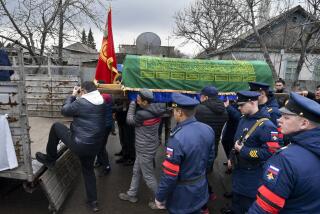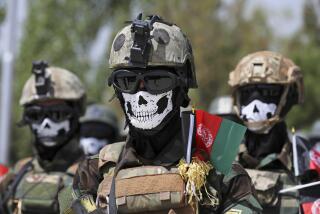Soviet Veterans Face Scorn, Pravda Says
- Share via
MOSCOW — Soviet veterans of the war in Afghanistan often face scorn and indifference from bureaucrats at home, while comrades slain in battle are ignored by the media and their tombstones do not say how they died, a newspaper account said Wednesday.
The Communist Party daily Pravda printed excerpts of letters from relatives, World War II veterans and other people on the treatment of young men who served in Afghanistan.
The excerpts were accompanied by a Pravda commentary.
In keeping with the Kremlin policy of glasnost , or openness, launched under Soviet leader Mikhail S. Gorbachev, Pravda acknowledged that the Soviet press had been unprepared to cover the Afghan conflict as it became obvious that the war would drag on for a long time.
“For several years, our press wrote just about friendship trees planted by Soviet soldiers in Afghanistan, about Soviet doctors helping Afghan women in labor while the Afghan army routed the . . . (rebels),” it said.
At least 115,000 Soviet servicemen are now deployed in Afghanistan, helping the Kabul government combat a widespread Muslim insurgency.
The official indifference or even hostility that Pravda said returning Soviet soldiers encounter echoes the experiences of many American veterans of the Vietnam War.
‘I Didn’t Send You’
Several Pravda readers wrote that many of the Soviet returnees asking for help are dismissed by their countrymen with the retort: “I didn’t send you to Afghanistan!”
Anatoly N. Shevchenko, a construction worker from the Byelorussian city of Kovel whose son Yuri was killed in action in November, said the young sergeant’s gravestone only lists his name, birth date and the date of his death.
“Why is it forbidden to write that he died fulfilling his internationalist duty in Afghanistan?” wrote Shevchenko. “What are we ashamed of?”
A Volgograd woman, Lyubov S. Yarovaya, wrote: “I can’t understand why on monuments which, by the way, are put up at state expense, it’s forbidden to mention that a soldier died in fulfilling his internationalist duty.”
One resident of the Crimean port of Sevastopol wrote that his brother Oleg, an army engineer, stepped on a mine in Afghanistan and had a leg blown off and an arm shattered.
Vladimir Y. Sheleg said his brother finally found work back home because a factory director proved to be a “heartfelt man,” but he was still looking for a place to live.
But before he found work, Soviet doctors downgraded the wounded soldier from a second-class invalid to a third-class invalid, a move that reduced the veteran’s government and pension benefits, Sheleg wrote.
More to Read
Sign up for Essential California
The most important California stories and recommendations in your inbox every morning.
You may occasionally receive promotional content from the Los Angeles Times.













